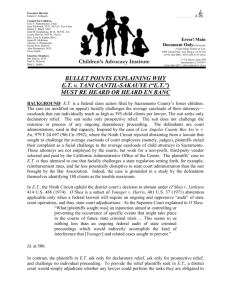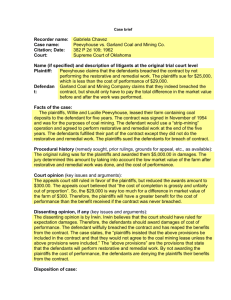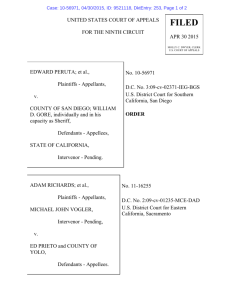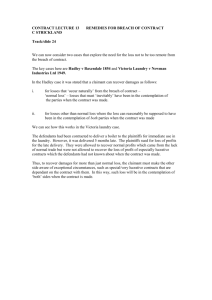JUDGE MICHAEL JOHNSON
advertisement
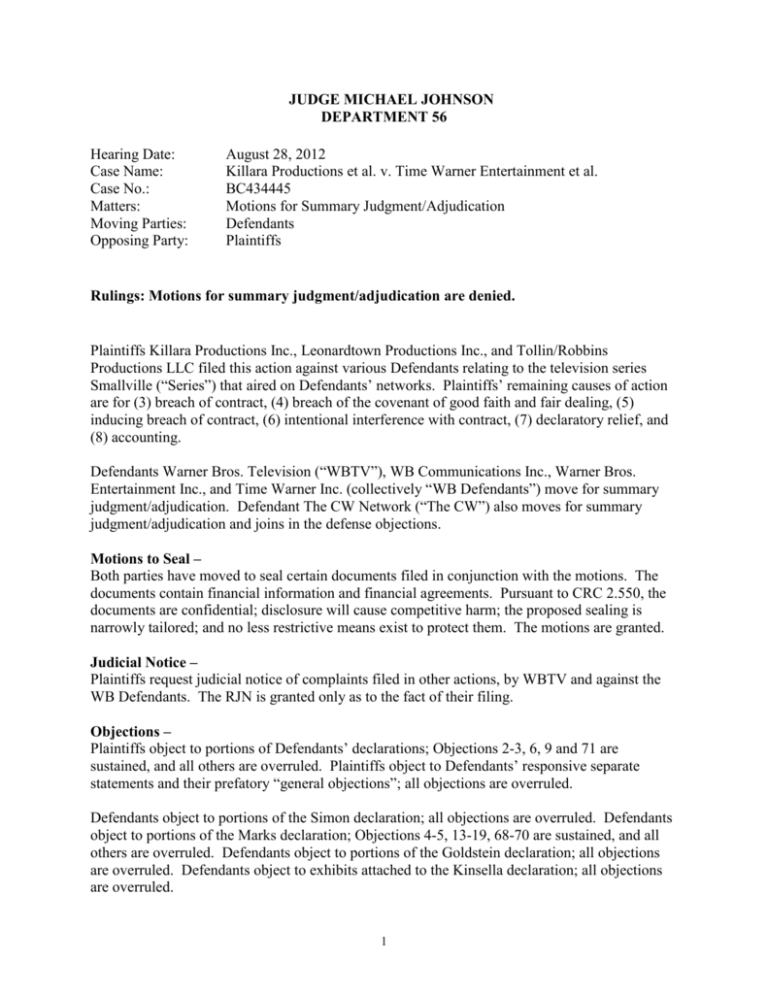
JUDGE MICHAEL JOHNSON DEPARTMENT 56 Hearing Date: Case Name: Case No.: Matters: Moving Parties: Opposing Party: August 28, 2012 Killara Productions et al. v. Time Warner Entertainment et al. BC434445 Motions for Summary Judgment/Adjudication Defendants Plaintiffs Rulings: Motions for summary judgment/adjudication are denied. Plaintiffs Killara Productions Inc., Leonardtown Productions Inc., and Tollin/Robbins Productions LLC filed this action against various Defendants relating to the television series Smallville (“Series”) that aired on Defendants’ networks. Plaintiffs’ remaining causes of action are for (3) breach of contract, (4) breach of the covenant of good faith and fair dealing, (5) inducing breach of contract, (6) intentional interference with contract, (7) declaratory relief, and (8) accounting. Defendants Warner Bros. Television (“WBTV”), WB Communications Inc., Warner Bros. Entertainment Inc., and Time Warner Inc. (collectively “WB Defendants”) move for summary judgment/adjudication. Defendant The CW Network (“The CW”) also moves for summary judgment/adjudication and joins in the defense objections. Motions to Seal – Both parties have moved to seal certain documents filed in conjunction with the motions. The documents contain financial information and financial agreements. Pursuant to CRC 2.550, the documents are confidential; disclosure will cause competitive harm; the proposed sealing is narrowly tailored; and no less restrictive means exist to protect them. The motions are granted. Judicial Notice – Plaintiffs request judicial notice of complaints filed in other actions, by WBTV and against the WB Defendants. The RJN is granted only as to the fact of their filing. Objections – Plaintiffs object to portions of Defendants’ declarations; Objections 2-3, 6, 9 and 71 are sustained, and all others are overruled. Plaintiffs object to Defendants’ responsive separate statements and their prefatory “general objections”; all objections are overruled. Defendants object to portions of the Simon declaration; all objections are overruled. Defendants object to portions of the Marks declaration; Objections 4-5, 13-19, 68-70 are sustained, and all others are overruled. Defendants object to portions of the Goldstein declaration; all objections are overruled. Defendants object to exhibits attached to the Kinsella declaration; all objections are overruled. 1 Facts – Tollin/Robbins Productions LLC (“Producers”) and Killara Productions Inc. and Leonardtown Productions Inc. (collectively “Writers”) entered into agreements in which they were to receive guaranteed fixed per-episode compensation and contingent compensation in the form of a percentage of the Series’ “Modified Adjusted Gross Receipts” (“MAGR”), calculated pursuant to a “Modified Adjusted Gross Definition” (“MAGD”). The Series was developed for WBTV by the Producers. On 9/13/00, WBTV pitched the Series to the Fox network (“Fox”); later that day, WBTV also pitched the Series to The WB network. WBTV licensed the Series to The WB in September 2000; the Series began airing in October 2001. The WB agreed to pay a license fee for the first season of the Series that was higher than the license fees The WB paid for the first season of 21 out of 23 other one-hour dramas that premiered on The WB between August 1996 and December 2003 (“23 WB Dramas”). The two series of the 23 WB Dramas that had the same license fee as the Series were cancelled after their first season. In 2006, The WB merged with another network to form The CW, on which the Series continued to air. The Series aired for ten seasons on television for a total of 218 episodes. The Writers served as “showrunners” for the Series through the seventh season. The Producers’ role is to best complete episodes through a series’ budget, which is initially determined based on what the network is willing to pay and what the studio is willing to deficit. CCP §437c(f) – Plaintiffs argue that Defendants’ present motions violate CCP §437c(f)(2) because they are renewed motions on the same issues asserted in their prior motion for summary adjudication. Defendants’ present motions are not identical to the prior motion and instead raise significantly different issues than the narrow damages issue previously asserted. See Patterson v. Sacramento City Unified School Dist. (2007) 155 Cal.App.4th 821, 827. Additionally, the prior motion was denied on procedural grounds and the merits were not addressed. The present motions do not violate §437c(f)(2). Plaintiffs argue that Defendants’ present motions violate CCP §437c(f)(1) because they do not dispose of an entire cause of action. Plaintiffs’ action asserts two theories of liability, selfdealing and accounting. Although Plaintiffs have attempted to blur the distinction between the two theories in their allegations, this cannot defeat an appropriately directed motion for summary adjudication. See Lilienthal & Fowler v. Superior Court (1993) 12 Cal.App.4th 1848, 1854-55. Defendants’ motions do not violate §437c(f)(1). Breach of Contract Causes of Action – 1. Affiliate Provision WBTV argues that it did not breach any of its express or implied contractual duties with Plaintiffs because it had the absolute discretion to determine the terms of its license agreements and to do business with its affiliates. It is undisputed, however, that the Writers’ MAGD contained a provision that stated “[a]ll agreements between Warner and its parent, subsidiary, and affiliated companies shall be made in good faith and on the substantial equivalent of an arms-length basis.” 2 Plaintiffs have demonstrated triable issues regarding these provisions: whether WBTV complied with its arms-length obligations, whether a provision which proposed to add that the agreements be “for fair market rates consistent with licenses granted by Warner to non-affiliates” was included in the Producers’ MAGD; whether the absolute discretion clause applies to the Producers without limit; and whether the Producers’ MAGD inherently included the equivalent of an affiliate, arms-length provision. These triable issues prevent summary adjudication of both the express and implied contractual claims. 2. Damages WBTV argues that Plaintiffs’ damages are speculative because they cannot establish greater profits if the Series had been licensed to Fox or another network or if the Series’ license agreements had contained more favorable terms. Plaintiffs need only establish reasonable certainty regarding the fact of their damage or harm, not regarding the monetary value of the damages they have suffered. Even as to this issue, the parties’ arguments and evidence shows that the fact of Plaintiffs’ damage is an inherently factual determination that cannot be summarily adjudicated. Plaintiffs have demonstrated the following triable issues: whether Plaintiffs received terms comparable to other WBTV licensing deals; whether Plaintiffs’ received terms that met the customs and practices of the industry; whether Plaintiffs would have obtained greater compensation if the Series’ license agreements had higher licensing fees or more favorable terms; whether Plaintiffs would have received greater compensation from The WB and CW if the Series’ license agreements were negotiated and renegotiated in good faith and at arms-length; and whether other series cited by WBTV are in fact comparable to the Series. 3. Remaining WB Defendants The WB Defendants (excluding WBTV) assert that Plaintiffs cannot establish that they intentionally interfered with the contracts or induced WBTV to do so. These WB Defendants primarily argue that Plaintiffs cannot recover on their breach of contract claims, and for this ground they have failed to cite to either their separate statement or to supporting evidence. For that reason they have failed to carry their initial burden on summary judgment. And in all events, Plaintiffs have submitted evidence that executives from these remaining WB Defendants (particularly the president of WBE) intervened in the decision to license the Series to The WB and in renegotiations of the license agreements. This raises triable issues of fact for the interference claims against these WB Defendants. Statute of Limitations – The WB Defendants argue that Plaintiffs’ action is barred by the statute of limitations, because Plaintiffs knew all relevant facts through the Series’ initial licensing in 2000 and subsequent renewals, but did not file this action until 3/10. They contend this violates the 4 year statute of limitations on the breach of contract causes of action and the 2 year statute on the interference causes of action. There are triable issues regarding this defense. 3 First of all, it is not clear as to precisely when the statute of limitations accrued under the circumstances of this case. The WB Defendants cite to Ladd v. Warner Bros. Entertainment, Inc. (2010) 184 Cal.App.4th 1298, in support of their argument that each licensing agreement triggers a separate statute of limitations. But Ladd did not consider the statute of limitations with respect to multiple license agreements and only noted, without discussion, that the trial court determined the applicable statute of limitations based on a profit participation claim of a license agreement; 184 Cal.App.4th at 1309 n.7. In all events, Plaintiffs have raised triable issues as to whether the tolling agreements only cover routine audits and not Plaintiffs’ breach of contract and interference claims, by showing that the language of the tolling agreements is broad (“any legal, equitable bars or limitations” on Plaintiffs’ rights), and that the audits addressed under-market network license fees. Plaintiffs have also raised triable issues as to whether the WB Defendants other than WBTV are not bound by the tolling agreements, by showing that WBE signed some of the agreements, and that it would be illogical to require filing claims against affiliates while tolling claims against the principal party. Finally, Plaintiffs have raised triable issues as to whether they are entitled to delayed accrual based on the discovery rule under cases such as April Enter. v. KTTV (1983) 147 Cal.App.3d 805, 826. Punitive Damages – The WB Defendants (excluding WBTV) move for summary adjudication of Plaintiffs’ claims for punitive damages. They contend punitive damages are not available in actions arising out of contract, including interference claims; see PM Group, Inc. v. Stewart (2007) 154 Cal.App.4th 55, 69. Plaintiffs have raised triable issues on this question, because their punitive damage claims are directed against non-parties to the relevant contracts; see Ramona Manor v. Care Enter. (1986) 177 Cal.App.3d 1120, 1142. These WB Defendants also contend that Plaintiffs cannot meet their evidentiary burden of proving oppression, fraud or malice by clear and convincing evidence. But Plaintiffs have raised triable issues on this question, because weighing the evidence regarding entitlement to punitive damages is a matter for the jury. The CW’s Motion – The CW separately moves for summary judgment or adjudication on the causes of action for interference with contract. It relies on the same grounds as the WB Defendants (no breach of contract, no damages, the statute of limitations, and punitive damages), and for the reasons discussed in the ruling on their motion there are triable issues of fact for these grounds. Independently, The CW argues that it did not engage in intentional acts designed to interfere with Plaintiffs’ contracts, because it determined and approved the license fees for the Series and was entitled to ask for and pay a lower fee than Plaintiffs would have preferred. But Plaintiffs have raised triable issues with evidence that The CW’s license fees were predetermined before any negotiations took place between The CW and WBTV, resulting in fees that were lower than 4 if The CW and WBTV had negotiated in good faith and at arms-length. This supports an interference claim. See Woods v. Fox Broadcasting Sub., Inc. (2005) 129 Cal.App.4th 344, 356. The CW also argues that its actions were not the proximate cause of any damages to Plaintiffs, because it is a new entity created in 2006 and simply followed the process that had been created under The WB’s regime. Plaintiffs have submitted evidence which establishes triable issues for this argument: whether there is an exception to successor liability, see Fisher v. Allis-Chalmers Corp. Product Liability Trust (2002) 95 Cal.App.4th 1182, 1188, and whether The CW’s conduct was a knowing continuation of the tortious conduct of The WB. Disposition – The motions for summary judgment and summary adjudication by all Defendants are denied. 5
![[Click and Enter Attorney Name], State Bar No - E](http://s3.studylib.net/store/data/007177564_1-4d9407aff5e1ecb2a5922cd955484ee2-300x300.png)

